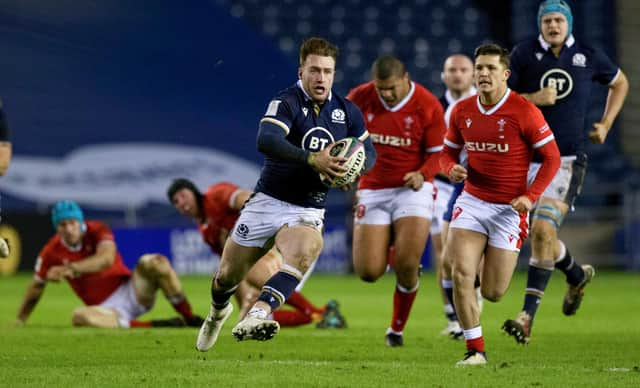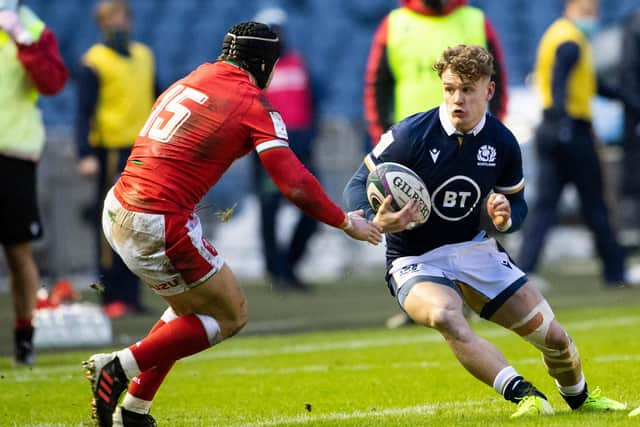Scotland v Wales was the best international played in the northern hemisphere this strange season


At Twickenham the week before, the self-discipline of the Scottish team and especially the forwards was exemplary, and we won. Against Wales on Saturday it wasn’t, and we lost. The match turned in the last few minutes of the first half, when a succession of soft or careless penalties were conceded. So we went from the Welsh 22 back to deep in our one, and, with yet another penalty advantage being played, to a Welsh try.
So instead of going into the interval 17-3 up, the score was 17-8 and what had seemed fragile Welsh self-belief was stiffened. This sequence of self-inflicted wounds contributed to defeat even more significantly than the red card given to Zander Fagerson. I can’t, before the penalty sequence, have been alone in counting yet unhatched chickens: was it going to be a day like that wonderful one in Cardiff in 1982 when we ran in five tries to win 34-18?
Advertisement
Hide AdAdvertisement
Hide AdWell, as we know it wasn’t, and we are left, once again, with lots of “ifs” and “might-have beens”, running right up to the last minute when Owen Watkin’s tap-tackle brought down Duhan van der Merwe as he stormed towards the try-line and we were then denied a plausible penalty at the ruck which followed. But we were also left with the memory of a splendid game, by some way the best international played in the northern hemisphere this strange season. Things being as they are , a match of this quality is more heartening that say a 12-9, all penalties, win would have been.


The players of both teams have earned our thanks. It must be difficult playing an international match in an empty stadium with no crowd to create atmosphere and spur you on. There is a sort of ghostly unreality. Try to imagine how meaningless the famous slow walk David Sole led from the tunnel to the pitch in the 1990 Grand Slam decider might have seemed in an empty Murrayfield, and you may begin to understand how the absence of a crowd drains emotion from a game. Yet the players overcame this, to give us a match that will be etched in the memory when countless others are forgotten.
A few days on it’s natural to wonder if this is a set-back for the team Gregor Townsend is putting together. One can certainly argue that defeat – failure to win from a winning position – represents a halt in its progress. It probably means that at best we will finish second or third in the championship table, and, even if this is something we would mostly have settled for happily a few weeks ago, there is still disappointment as there must always be when high hopes are dented.
Yet there was much more to encourage than discourage, though, in the wake of defeat, saying this is always a touch like the (mythical) line, “apart from that, Mrs Lincoln, how did you enjoy the play?” Factor out the penalties conceded, and the forwards were again excellent, even though we lost a couple of lineouts on our own throw. We almost certainly missed Jamie Ritchie’s skill, judgment and timing at the breakdown, but he should be back for our next match in Paris.
I still think the forwards persist too long in keeping possession and attempting to score by “pick and drives” when close to the try-line. Given the striking quality of our backs, there is almost always the right moment to release the ball to them; and too often the right moment passes without release. Ali Price has generally been excellent this season, but here surely he should take command just as Antoine Dupont does for France.
A word on the red card is unavoidable. There were mitigating circumstances as there weren’t in the case of Peter O’Mahony in Cardiff the week before, and a yellow might have seemed fairer as indeed the TMO seemed to argue. Nevertheless Zander did charge in like an angry buffalo and there was contact with Wyn Jones’s head. Owen Slot in a very good article in the Times yesterday made the point that what seem hard decisions at the time come to be accepted and so help to make the game safer. He listed five such cases beginning with Sam Warburton’s tip tackle on Vincent Clerc in the 2011 World Cup. The referee, Alain Rolland, was fiercely criticised at the time (not only by the Welsh Press), but we no longer see tackles like that now. Reckless charging into a ruck or maul will go the same way because players will learn and exercise more self-control.
A message from the Editor:
Get a year of unlimited access to all The Scotsman's sport coverage without the need for a full subscription. Expert analysis of the biggest games, exclusive interviews, live kmlblogs, transfer news and 70 per cent fewer ads on Scotsman.com - all for less than £1 a week. Subscribe to us today
Comments
Want to join the conversation? Please or to comment on this article.